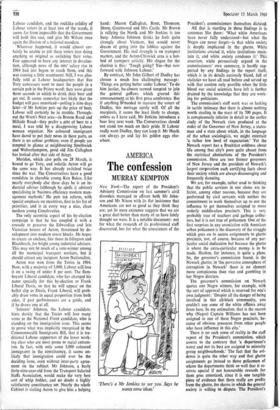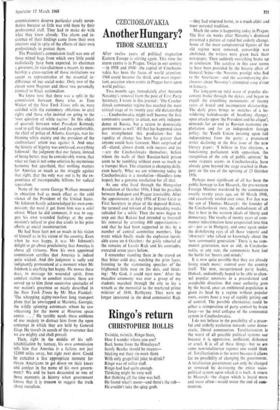The confession
AMERICA MURRAY KEMPTON
New York—The report of the President's Advisory Commission on last summer's civil disorders managed to affront both Mr John- son and Mr Nixon with its flat insistence that Americans are not as good as they think they are; yet its mere existence suggests that we are a great deal better than many of us have lately thought we were. It is a notable document: not for what the research of its professional staff discovered, but for what the consciences of the President's commissioners themselves dictated. All that is startling in these findings is in sentences like these: 'What white Americans have never fully understood—but what the Negro can never forget—is that white society is deeply implicated in the ghetto. White institutions created it, white institutions main- tain it, and white society condones it.' This assertion, while persuasively argued in the commissioners' own summary, is hardly sup- ported by . any findings in the report itself, which is in its details curiously bland, full of statistics we have all read before and served up with that caution only possible when the little blood our social scientists have left is further drained by the knowledge that they are work- ing for politicians.
The commission's staff work was so lacking in tactile intimacy that there is almost nothing worth stealing in the mass of its 700 pages. It is conspicuously inferior in detail to the earlier study of the Newark riots produced at the order of the Governor of New Jersey, a states- man and a state about which, in the language of the urban sociologists, we might entertain 'a rather low level of expectation.' Yet the Newark report has a Brechtian coldness about life among that city's poor quite absent from the statistical abstractions of the President's commission. Here are two former governors of New Jersey and the president of Newark's largest corporation each certifying facts about their society which are always discouraging and frequently damning.
We are, for example, rather used to thinking that the public services in our slums are in- ferior, among other reasons, because they are performed by civil servants with' neither the commitment to work themselves up to nor the influence to get themselves assigned to more orderly middle-class precincts. This is very probably true of teachers and garbage collec- tors, but it is not true of policemen. One of the first surprises in any association with American urban policemen is the discovery of the struggle which goes on to secure assignments to ghetto precincts, not, of course, because of any par- ticular social dedication but because the ghetto is where the extra-curricular money- is to be made. Harlem, for instance, is quite a plum. So, the governor's commission found, is the Newark ghetto; in 'the pervasive atmosphere of corruption in Newark' there is no element more conspicuous than vice and gambling in her Negro districts.
The governor's commission on Newark quotes one Negro witness, for example, with the sort of approval which is reserved for one's own judgment: 'Despite all the danger of being involved in this all-black community, you couldn't run some of the white officers away from here. In my estimation, that is the reason why (Negro) Captain Williams has not been assigned to one of these Negro precincts, be- cause of obvious pressures from other people who have influence in this city.'
There is no such sense of reality in the staff report of the President's commission, which asserts to the contrary that 'a department's worst and not its best are assigned to minority group neighbourhoods.' The fact that the evi- dence is quite the other way and that ghetto assignments go instead to those policemen of whom the departments think so well that it re- serves special if not honourable rewards for them goes unnoticed, since it is one tangible piece of evidence that there really are profits from the ghetto, for shares in which the general society is willing to dispute. The President's
commissioners deserve particular credit never- theless because so little was told them bytheir professional staff. They had to make do With what they knew already. The alarm and in- sistence of their findings came from their own interiors and in spite of the efforts of their own professionals to protect them.
The President's commission itself was one of those mixed bags from which very little could realistically have been expected, its chairman a governor, its vice-chairman a mayor, its mem- bership a cross-section of those institutions we accept as representative of the essential in- difference of our social order. Only two of the eleven were Negroes and those two personally inimical to black nationalism.
We know now that there was a split in the commission between those who, as Tom Wicker of the New York Times tells us, were satisfied with the customary oblations to civil rights and those who insisted on going to the 'root qtiestion of white racism.' In this oldest of quarrels between what President Kennedy used to call the concerned and the comfortable, the chief of police of Atlanta, Georgia, was for blaming white society and the president of the steelworkers' union was against it. And once the history of bigotry was confessed, everything followed: the judgment that our future, instead of being better, may be considerably worse, that what we face is not some solution by mysterious harmony but apartheid, that nothing matters for America so much as the struggle against that right, that the only way out is by the ex- penditure of incomputable billions for radical reparation.
None of the scorn George Wallace mounted in objection had as much effect as the cold silence of the President of the United States. Mr Johnson barely acknowledged his own com- mission; the most it got from him was a nihil obstat. When he did comment, it was to sug- gest his own wounded feelings at the com- mission's refusal to give due credit to his prior efforts at social reconstruction.
He had been hurt not so much in his vision of himself as in his vision of the country. Even when he was happy, it was Mr Johnson's delight to go about proclaiming that America is above all virtuous. Now his own appointed commission certifies that America is indeed quite wicked. And _this judgment is sadly and indignantly pronounced at a moment when Mr Johnson is anything but happy. He moves these days, to massage his wounded spirit, from comfort station to comfort station; there are served up to him those successive spectacles of our nation's greatness so nicely described in the New York Times by Mr Max Frankel: 'The whopping eighty-two-foot long transport plane that he unwrapped at Marietta, Georgia; the wildly spinning astronauts whom he saw rehearsing for the moon at Houston space centre. . . .' He terribly needs these emblems of our majesty to distract him from the open contempt in which they are held by General Giap. He travels in search of the assurance that we are mighty and shall prevail.
Then, right in the middle of his self- rehabilitation by fantasy, his own commission tells him that America is a failure, not just 12,000 miles away, but right next door. Could he conceive a less appropriate moment for eleven Americans to get down on their knees and confess in the name of his own govern- ment? We and he have descended to one of those moments in history when government knows that it is treason to suggest the truth about ourselves.











































 Previous page
Previous page